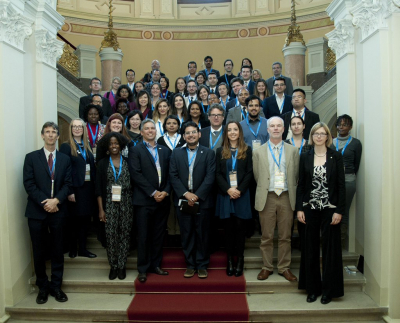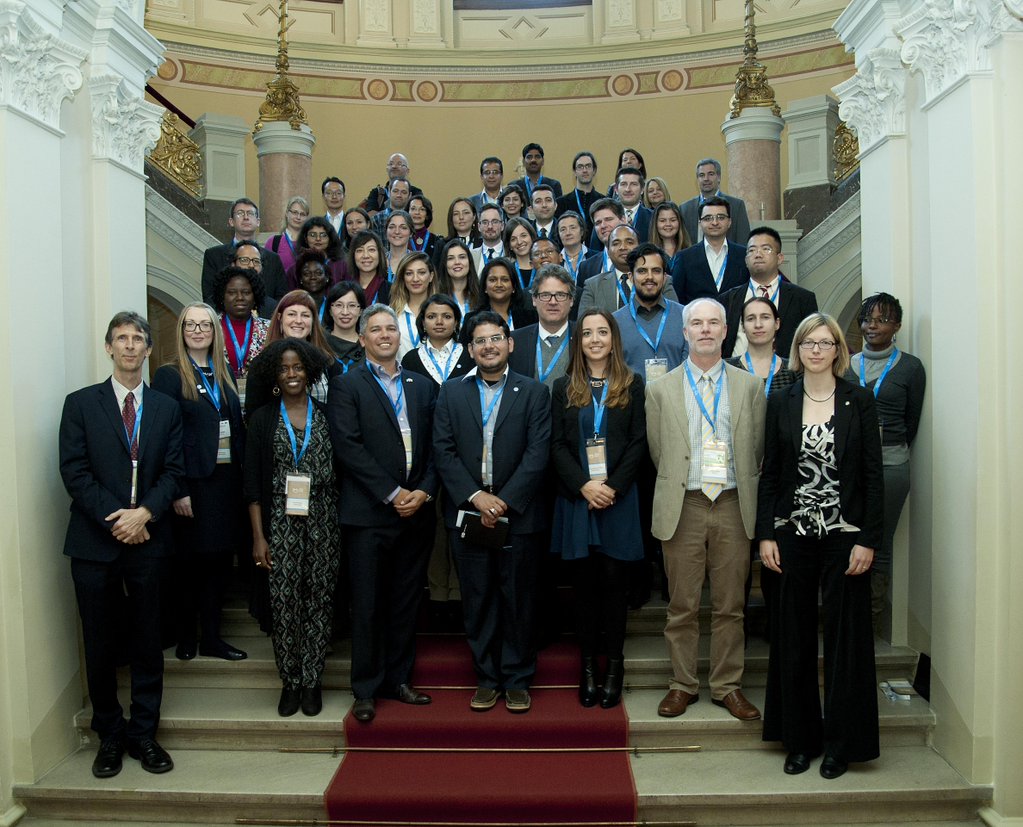


Recent updates:
7 January 2016: Following the events in Budapest, Hungary, in November last year, young scientists videos are now available on the Videotorium link HERE . Lectures include those given by IAP-nominated young scientists, Luis Alvarez, Ma'n Zawati, and others, and WAYS young scientist - Eli Grant.
IAP young scientist and Co-chair, Global Young Academy, Eva Alisic, gave a presentation on young scientist contributions to building a resilient society, available HERE.
As part of the follow up to the events in Budapest, two young scientists (Romana Siddique, nominated by the Bangladesh Academy of Sciences, and Abdelslam Badre, from Morocco, nominated by the Global Young Academy), have been selected to participate in the 'UNISDR Science and Technology Conference on the Implementation of the Sendai Framework for Disaster Risk Reduction 2015-2030', 27-29 January 2016, Geneva, Switzerland, with the support of IAP.
***************
Budapest, 4-7 November 2015
Sandwiched between the release of the Sustainable Development Goals (SDGs) on 25 September, and the forthcoming COP21 climate change negotiations in Paris, France, in December, this year’s World Science Forum provided a timely opportunity to discuss the input of scientific research and science advice into global policy-making.
More than 900 science leaders from over 100 countries gathered at the 2015 WSF, hosted by the Hungarian Academy of Sciences (HAS), under the theme ‘The Enabling Power of Science’. At the opening session, the Prime Minister of Hungary, Viktor Orbán, welcomed the delegates, while President of the WSF and HAS, Lászlo Lovász, called upon delegates to do more to accelerate the accumulation, use and diffusion of scientific knowledge and its application in technological innovations capable of reshaping our world for the better, adding : “How meetings like this rise to the challenge of building greater consensus about how to apply the best of science will certainly play, in no small part, a major role in determining humankind's success or failure in the 21st century. There is no margin for error. (See: http://www.sciforum.hu/news/news/over-900-leaders-from-100-countries.html)
Prior to the official opening, however, IAP joined together with WAYS, ICORSA and GYA to convene a group of 50 young scientists from 30 countries. This is the first time these four organizations, each with an interest in promoting the involvement of young scientists in  global decision-making, had come together to organize such an event.
global decision-making, had come together to organize such an event.
 Using the allotted four-hour time-slot as efficiently as possible, in the first hour the young scientists were introduced to the four convening organizations, introduced to one another, given an overview of the concept of ‘science diplomacy’ by Marga Gual Soler of AAAS – a concept that was unfamiliar to many of them – and given a brief overview of the SDGs by IAP coordinator, Peter McGrath.
Using the allotted four-hour time-slot as efficiently as possible, in the first hour the young scientists were introduced to the four convening organizations, introduced to one another, given an overview of the concept of ‘science diplomacy’ by Marga Gual Soler of AAAS – a concept that was unfamiliar to many of them – and given a brief overview of the SDGs by IAP coordinator, Peter McGrath.
The 50 young scientists were then split into five groups and challenged with devising novel solutions for one or other of the SDGs. Built into the challenge was a Lion’s Den presentation – whereby each group was allotted just two minutes to pitch their idea to a high-level panel of judges.
Their reports are available HERE.
The panel of judges voted the ‘Jobs for the Future’ presentation as the most novel and potentially transforming idea – so as a ‘prize’, a member of the team, Tolu Oni from South Africa, was given a slot in the WSF session ‘Enabling Science through Parliamentary Governance’.
Also during this session, chair Safwan Toqan, Member of the Jordanian Senate, challenged other panel members and the audience to consider ways that parliamentarians could receive science advice and also how scientific issues being considered by parliament could be communicated more widely to the public.
Responding from among the assembled delegates, Peter McGrath highlighted to role of academies of science in both these aspects, noting that parliamentarians could play a key role by ensuring that their national academies were properly supported to play this role while maintaining their independence from the government.
Likewise, Virginia Murray, consultant in global disaster risk reduction, Public Health England, and the UK Government member on the UN International Strategy for Disaster Scientific and Technical Advisory Group (IAP contributes to the activities of this group), informed the panel of parliamentarians that: “If we don’t deal with disasters more effectively, we will hold back the achievement of the SDGs.” She added that the Sendai Framework, written by UN Member States with input requested from the scientific community, provides a great opportunity for scientists to contribute to science-for-policy efforts in the Framework’s implementation.
Other WSF sessions also integrated interventions from young scientist Lion’s Den protagonists into their panel discussions:
In this session, too, Dato Lee Yee Cheong, president of ISTIC and chair of the IAP Science Education Programme’s Global Council, proposed that SDG 5, Achieve gender equality and empower all women and girls, should be regarded as the over-arching SDG. “If we achieve SDG 5,” he said, “We will be sure to achieve all the other SDGs.”
In addition, in the session on ‘Challenges in Global Cooperation: Practices and Pitfalls’, moderated by Alan Leshner, CEO emeritus, AAAS, Ines Carabajal , Argentina, presented on her work that is attempting to integrate both the natural and social sciences.
Another young scientist, Henry Roman, chair of WAYS-Africa, was included in the parallel session ‘Science Governance in Africa’, moderated by IAP co-chair, Mohamed Hassan. The panel, which also featured TWAS executive director Romain Murenzi, reviewed some of the challenges regarding carrying out research in Africa, including lack of government investment. Among the positive developments, however, have been the establishment of the African Observatory on STI (AOSTI) in Equatorial Guinea that now monitors progress in African science, coordinated science development actions through the Africa Union and the African Ministerial Council on Science and Technology (AMCOST), and the advance of science in South Africa. In this regard, Henry Roman noted that South Africa was ranked 19th in the world in water research, and that this was an area where South African expertise can be shared across the continent.
Picking up this theme, Hassan called for leading universities and research institutions in Africa to establish integrated, interdisciplinary centres to develop innovative ways to tackle the challenges being faced by the continent.
For the final session of the WSF, delegates moved to the building of the Hungarian Parliament, where they were addressed by János Áder President of Hungary.
“Whatever solutions to our global challenges that will be found in the world’s laboratories,” he said, “will not be effective without the active involvement of politicians and the public. It is the role of politicians to help scientists.” With regard to communicating research results to the public, President Áder also added: “Scientists must raise their voices loud enough so as to drown out the 21st century cacophony of half-truths, false claims and cynicism.”
Following the Hungarian president, Irina Bokova, Director-General of UNESCO emphasized the need for innovative solutions that can balance the growing scarcity of resources in the world. “We must make use of the greatest source of renewable energy that we have,” she said. “Human resourcefulness and creativity.”
The closing session, on ‘Parliamentary Session: Science in Policy Making’, was chaired by Sir Peter Gluckman, science adviser to the Prime Minister of New Zealand. The distinguished panel of the first part of the session included Abdul Hamid Zakri, science adviser to the Prime Minister of Malaysia, a member of the UN Secretary-General's Scientific Advisory Board, and chair of IPBES. This part ended with young scientist Ivana Gadjanski, a neurobiologist from Serbia, explaining how policy-making could be considered the brain while science provides the muscle. Connecting the two are many neurons running up and down the backbone. “Young scientists can help at the science-policy-making interface,” she said. “We are young and can act quickly, like rapidly-firing neurons.”
Read the full text HERE of Gadjanski’s presentation, or view the video.
In the second part of the ‘Parliamentary Session: Science in Policy Making’ session, among those bringing expertise from government was H.E. Naledi Pandor, Minister of Science and Technology, South Africa. In her remarks, she noted that she relies heavily on the Academy of Science of South Africa for science advice, especially as the academy is often pro-active, presenting issues of interest before they are of major interest to policy-makers.
The WSF ended with the release of the Declaration of the 7th World Science Forum on ‘The Enabling Power of Science’. In the Declaration are calls for improved quality in science education, as well as greater empowerment of young scientists and women scientists. The Declaration also specifically mentions IAP, noting: “The expansion of science advice mechanisms ranging from informal personal interactions, through voluntary or requested reports created by well-established networks of academies, such as the InterAcademy Partnership (IAP) and related regional networks such as EASAC, to the formal advisory structures of both legislative and executive bodies, has also made more apparent the fundamental responsibilities that follow the provision, communication and use of advice,” and makes two specific recommendations in this regard:
· We call for concerted action of scientists and policy-makers to define and promulgate universal principles for developing and communicating science to inform and evaluate policy based on responsibility, integrity, independence, and accountability.
· We call on all scientists to monitor and assess policy areas and provide, in a pro-active manner, independent and timely science advice even when its application is not guaranteed or not expected.
The final words of the 2015 WSF were left to Her Royal Highness, Princess Sumaya bint El Hassan of Jordan, who will host of the next WSF in 2017 under the theme of ‘Science For Peace'.
Other resources
Our young scientists and many others were active on Twitter during the WSF. Check out the conversation at:
https://twitter.com/hashtag/wsf2015
Many photos of the WSF are available at: http://www.sciforum.hu/gallery/photos/index.html